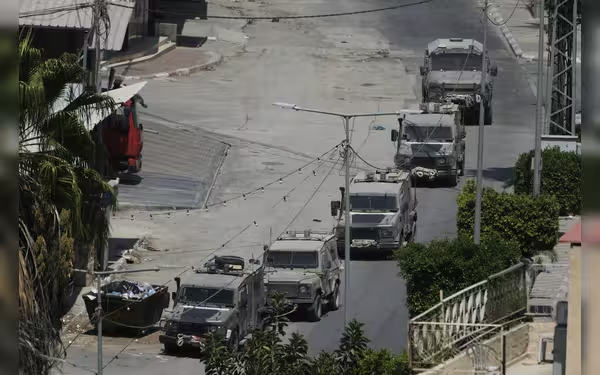Saturday, November 16, 2024 07:38 PM
UK Considers Further Arms Export License Suspensions to Israel
- UK may suspend more arms licenses to Israel.
- Concerns over potential war crimes in Gaza.
- Foreign Secretary emphasizes humanitarian law compliance.
 Image Credits: arabnewspk
Image Credits: arabnewspkUK may suspend more arms export licenses to Israel amid concerns over humanitarian law violations in Gaza.
The ongoing conflict between Israel and Palestine has raised serious concerns globally, particularly regarding the use of arms and their implications on humanitarian law. Recently, the United Kingdom has taken steps that may lead to the suspension of more arms export licenses to Israel. This decision stems from fears that these weapons could be used to violate international humanitarian law in the regions of Gaza and the West Bank.
Every six weeks, the UK government reviews its arms export licenses, and it appears that further action may be taken if more evidence of potential war crimes surfaces. A government source indicated, "No one’s patting themselves on the back and declaring an end to the matter." This statement reflects the seriousness with which the UK is approaching the situation.
On Monday, Foreign Secretary David Lammy announced the immediate suspension of 30 out of 350 arms export licenses to Israel. He emphasized that this decision was made due to the risk that the equipment might be used to commit serious violations of international humanitarian law. Lammy clarified that this suspension does not equate to a blanket ban or an arms embargo; it specifically pertains to those arms that could be utilized in Israel's military actions in Gaza.
In his address to parliament, Lammy acknowledged Israel's right to defend itself against security threats but expressed deep concern over the methods employed by Israel, particularly regarding civilian casualties and the destruction of civilian infrastructure. He stated, "We recognize, of course, Israel’s need to defend itself against security threats, but we are deeply worried by the methods that Israel’s employed." This highlights the delicate balance the UK is trying to maintain between supporting an ally and upholding international law.
A summary of the government’s legal position revealed that there are "credible" claims of mistreatment of Palestinian prisoners of war and an "insufficient" supply of aid to Gaza, which have contributed to the call for a weapons embargo. However, the government also noted the challenges in reaching a definitive judgment about Israel’s conduct in Gaza, citing an "opaque and contested information environment." This indicates the complexities involved in assessing the situation on the ground.
While there has been significant international media coverage from the West Bank, the situation in Gaza remains less transparent, as Israel has restricted foreign journalists from reporting on the conflict. This lack of information complicates the UK’s ability to make fully informed decisions regarding arms exports.
Criticism of the UK’s decision to suspend some arms sales has emerged from various quarters. Some British politicians and Jewish groups have accused the Labour government of abandoning Israel, while others argue that the measures taken do not go far enough. Despite being a smaller arms exporter to Israel compared to the US and Germany, this decision is viewed by some analysts as indicative of Israel’s growing diplomatic isolation.
The UK’s potential suspension of arms export licenses to Israel underscores the ongoing tension between national security interests and adherence to international humanitarian law. As the situation evolves, it remains crucial for governments to navigate these complex issues carefully, ensuring that their actions align with their commitments to human rights and global peace. The world watches closely, hoping for a resolution that respects the rights and lives of all individuals affected by this enduring conflict.













